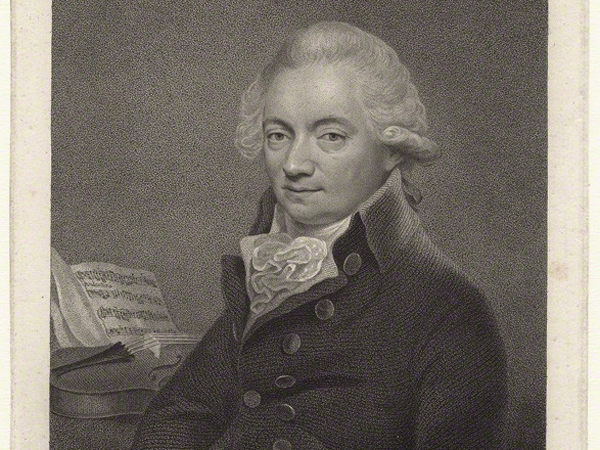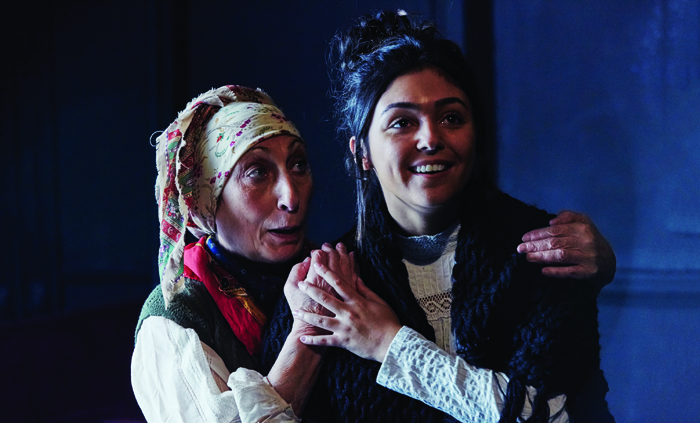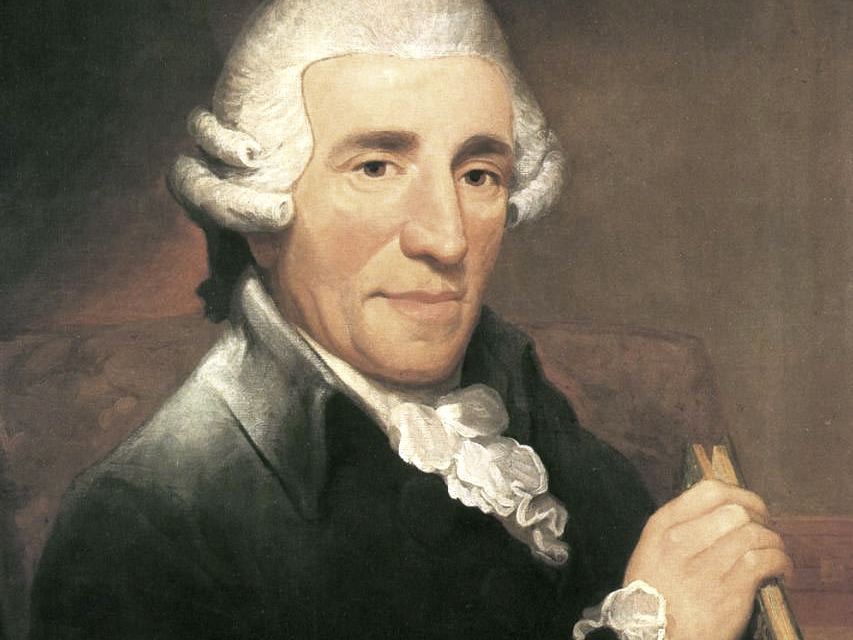A controversial new play comes to London this Sunday as part of Vibrant 2019 – A Festival of Finborough Playwrights. Written and performed by Palestinian political prisoners, alongside Israeli playwright Einat Weizman, Prisoners of the Occupation has already been banned…
Say it loud, say it proud!
London's most Jewish neighbourhood? Highgate of course!
Vasily Grossman's Stalingrad
EFG London Jazz Festival 2018
Get a look at the four student films set to be showcased at the 11th TAU Night at the Movies
A look at the life of Johann Peter Salomon, the Jewish-born musician, impresario and creative force behind Haydn's Creation
 Ballet Rambert’s new production – with 50 dancers and 70 musicians from the Rambert Orchestra onstage, soloists and chorus from the BBC Singers, and designs by Pablo Bronstein – marries dance to the soaring music of Haydn’s mighty oratorio and its beautiful libretto, taken from Genesis and the Book of Psalms, as well as Milton’s Paradise Lost. It comes to Sadler's Wells this month after a hugely successful premiere at Garsington Opera in July.
Ballet Rambert’s new production – with 50 dancers and 70 musicians from the Rambert Orchestra onstage, soloists and chorus from the BBC Singers, and designs by Pablo Bronstein – marries dance to the soaring music of Haydn’s mighty oratorio and its beautiful libretto, taken from Genesis and the Book of Psalms, as well as Milton’s Paradise Lost. It comes to Sadler's Wells this month after a hugely successful premiere at Garsington Opera in July.
These November performances of The Creation are elegantly timed for Jewish lovers of music and dance, as in synagogues worldwide we have just recently begun reading the Torah from the beginning again, with Genesis and the story of the creation.
A fascinating and little-known part of the story of the oratorio's creation is the role played by Johann Peter Salomon, German-Jewish-born musician, composer, conductor and impresario, in inspiring Haydn to compose the work. It was Salomon who provided Haydn with a libretto to draw on and refashion, that included those texts from the Bible and Milton. The pair seemed to have had a wonderful creative partnership, for Salomon originally brought Haydn to London, for the first time in 1791 and again in 1794. The symphonies Haydn composed specially for these visits are sometimes called the Salomon symphonies and as a violinist, Salomon joined Haydn to lead the first performances of many of the works he was inspired to compose in England.
Johann Peter Salomon was born in Bonn in the early 1740s into a family of Jewish musicians who thought it prudent for their infants' futures to baptise them. His sister Anna became renowned for her rich contralto voice and in Berlin, under the patronage of Prince Henry of Prussia, young Salomon composed several French operas with roles and arias for her to perform in concert.
Salomon was invited to Paris in the early 1780s and then to London, where he really found his niche. So much so that in 1790 he decided to visit Vienna to invite both Haydn and Mozart to come to London. It seems that both accepted, but sadly Mozart died in 1791. Haydn earned several hundred pounds and huge public adulation for the music he composed and played in London - imagine how the late Leonard Bernstein or Stephen Sondheim, Leonard Cohen or Bob Dylan would be feted if they, came to London to premiere compositions especially composed for Britain.
It's said, however, that Haydn refused to pay his orchestra and Salomon had to pick up the bill, which he did with a good grace. Unsurprisingly, Salomon's Jewish origins meant he was regularly accused of being mercenary, even though many regularly took advantage of his good nature. When he was called a Jew, it was of course a derogatory term. Yet by all accounts he had a winning personality, which made him popular with patrons and fellow musicians wherever he went. The gifted musician clearly had a good head for business too, a dream combination for an impresario.
Salomon went on to become one of the founder members of the Philharmonic Society and led the orchestra at its first concert on 8 March 1813. Salomon died in London in 1815, of injuries suffered when he was thrown from his horse, and is buried in Westminster Abbey. In 2011 the Royal Philharmonic Society instituted the Salomon Prize “to highlight talent and dedication within UK orchestras.” A fitting tribute indeed.
by Judi Herman
The Creation runs from Thursday 10 – Saturday 12 November, 7.30pm, £12-£45, at Sadler’s Wells Theatre, Rosebery Avenue, EC1R 4TN; 020 7863 8000. www.sadlerswells.com
If I were a rich girl… As Yiddish gem Treasure is unearthed at Finborough Theatre, Judi Herman polishes up on its backstory
 What do The Dybbuk, The Golem and Fiddler on the Roof have in common? Their stories were all originally written in Yiddish. From Franz Kafka to Danny Kaye, the influence of Yiddish theatre is far reaching. Four years before the first professional production in Yiddish took place in a Romanian wine garden in 1876, one of its most influential writers, David Pinski, was born into a cosmopolitan Jewish family in Mohilev, Russia (now Belarus). He moved to Warsaw, Switzerland, Vienna and Berlin before emigrating to New York in 1899, where he lived for 50 years. While there he was an active member of Jewish cultural and political life and was president of the Jewish National Workers’ Alliance from 1920-22, and president of the Jewish Culture Society from 1930-53. Finally, in 1949, the committed left-wing Zionist moved to Israel, where he lived until his death in 1959.
What do The Dybbuk, The Golem and Fiddler on the Roof have in common? Their stories were all originally written in Yiddish. From Franz Kafka to Danny Kaye, the influence of Yiddish theatre is far reaching. Four years before the first professional production in Yiddish took place in a Romanian wine garden in 1876, one of its most influential writers, David Pinski, was born into a cosmopolitan Jewish family in Mohilev, Russia (now Belarus). He moved to Warsaw, Switzerland, Vienna and Berlin before emigrating to New York in 1899, where he lived for 50 years. While there he was an active member of Jewish cultural and political life and was president of the Jewish National Workers’ Alliance from 1920-22, and president of the Jewish Culture Society from 1930-53. Finally, in 1949, the committed left-wing Zionist moved to Israel, where he lived until his death in 1959.
Pinski wrote over 60 plays and there were novels too. His subject matter ranged from stories of the lives, struggles and dreams of the ordinary Jewish folk to Biblical themes, including both King David and King Solomon, their wives, and the coming of a future Messiah.
Treasure is arguably his comic masterpiece, revived here in a brand new adaptation by Colin Chambers. The play premiered in 1912 and remained popular in the Yiddish repertoire until the 1940s (with a production in the Vilna Ghetto in 1943), was staged in German by Max Reinhardt in 1919 and in English on Broadway in 1920. The story follows poor gravedigger’s daughter Tille, who must decide whether or not to keep a pile of gold coins her brother finds at the graveyard. Should she hand it in and remain in a life of drudgery or use it to turn her world around?
Its latest incarnation in a production at London’s Finborough Theatre is directed by Alice Malin. What drew her to Pinski’s comedy? “It’s a story of female emancipation and it has real wow factor. Tille seeks freedom by using found money for her own ends and that wowed me. Plus it’s resonant today in how humanely it treats poverty and approaches the subject of inequality. Its dirt poor protagonists are united by the same goals, being free and visible and having enough money to live. It’s really funny and outrageous, part farce, part tragedy.” Not to give too much away, as occupants of the graveyard come to life, it sounds as if Pinski’s story is magic realism. Alice agrees and adds that it’s “a strange surreal expressionist drama, judiciously nipped and tucked by Colin Chambers.”
Malin is confident the audience will share her enchantment with the “wry, witty heroine with chutzpah". She explains that "Tille is in her late teens and so poor that she has no prospects of marriage till her brother finds the treasure. She takes a massive gamble and going on the journey of its consequences is really intoxicating . She takes a massive punt buying clothes to make herself look genuinely rich so that potential husbands will consider her – not because she is vain and wants to look pretty, but to seize the chance of a better life. The whole community, especially the traditional menfolk, descend on the graveyard and demand that she be put back in her place, but she refuses and manages to keep one step ahead of them. Her mother Jachne Braine is constantly coming back with sarcastic comments, on the one hand terrified of the money and everyone wanting something from her, but on the other overwhelmed by the possibilities. The production boasts a cast of 15, with three Jewish cast members – Olivia Bernstone as Tille, Fiz Marcus as Jachne and Felicity Davidson as a town gossip. Malin assures that there will be dancing too, because “klezmer music and dance is really important.”
Treasure runs from Tuesday 20 October to Saturday 14 November. Finborough Theatre, 118 Finborough Rd, SW10 9ED; 0844 847 1652. www.finboroughtheatre.co.uk
Jewish sculptor Simone Krok found inspiration in Old Testament and Kaballah for exhibition based on Paradise Lost
 Acclaimed sculptor Simone Krok’s latest exhibition, Paradise Lost, is named after John Milton’s 17th-century epic poem and explores the crucial themes of Milton’s work: creation, the fall of man, the loss of innocence and of free will. Milton’s work was heavily influenced by the Old Testament and the story of Adam and Eve, and Krok also takes inspiration from the Old Testament, as well as other religious traditions. Many of the pieces in Paradise Lost are inspired by the Jewish spiritual practice of Kabbalah.
Acclaimed sculptor Simone Krok’s latest exhibition, Paradise Lost, is named after John Milton’s 17th-century epic poem and explores the crucial themes of Milton’s work: creation, the fall of man, the loss of innocence and of free will. Milton’s work was heavily influenced by the Old Testament and the story of Adam and Eve, and Krok also takes inspiration from the Old Testament, as well as other religious traditions. Many of the pieces in Paradise Lost are inspired by the Jewish spiritual practice of Kabbalah.
As a Jewish South African, much of Krok’s work has been influenced by the parallel injustices she witnessed in her early life, with the apartheid in her home country and the concentration camps she saw when she travelled to Eastern Europe. In this exhibition, Krok aims to explore why the human race ‘lose the innocence we were born with as children and why it is that we so frequently use our freedom of choice to enter into the destructive path of greed, power, violence and manmade suffering that is all too common in our modern world.’ Paradise Lost closes this Thursday, so be sure to catch it if you can.
By Alice Weleminsky-Smith
Paradise Lost runs until Thursday 18 June. Gallery 223, 137-139 Lower Marsh St, London SE1 7AE. www.gallery223.co.uk
 Simone Krok poses by The Sequence of Many Levels of Deception (also pictured above)
Simone Krok poses by The Sequence of Many Levels of Deception (also pictured above)
 (L-R) Bronze, Co-exist, Gold, Jacob's Ladder
(L-R) Bronze, Co-exist, Gold, Jacob's Ladder
JR at Jewish Book Week: Robin Renwick discusses the subject of his latest book, anti-apartheid campaigner Helen Suzman
This coming Tuesday 24 February Jewish Renaissance's editor Rebecca Taylor will be hosting a special event as part of Jewish Book Week. Taking place at London Jewish Museum, the afternoon will centre around the South African anti-apartheid campaigner Helen Suzman (pictured above visiting Meadowlands high school, Soweto in 1977).
In the darkest days of apartheid Helen stood alone in parliament, confronted by a legion of (mostly) chauvinist male politicians. Despite constant antagonism and threats of violence, she forced into the global spotlight the injustices of the country's minority rule.
Rebecca will be speaking to Robin Renwick, a former ambassador to South Africa, and author of Bright Star in a Dark Chamber, which tells the story of Helen Suzman (you can also read Rebecca's interview with Robin Renwick in the current issue of JR magazine).
Helen's daughter, Frances Jowell, and niece, the actor Janet Suzman will also be speaking. But you need to be quick – there's not long left to get tickets and they're selling fast!
The event, also titled Bright Star in a Dark Chamber, is on Tuesday 24 February. 1-2pm. £6.50. Jewish Museum, 129-131 Albert St, NW1 7NB; 020 7284 7384. www.jewishbookweek.com
To book tickets, email info@jewishbookweek.com or phone 020 7446 8771. Alternatively you can pick up tickets at the venue on the day.









